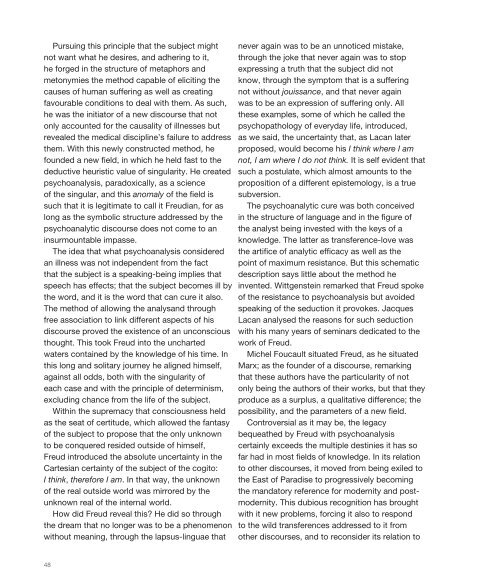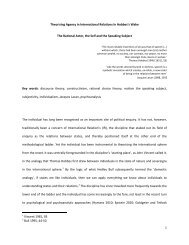sigmund freud's collection an archaeology of the mind
sigmund freud's collection an archaeology of the mind
sigmund freud's collection an archaeology of the mind
You also want an ePaper? Increase the reach of your titles
YUMPU automatically turns print PDFs into web optimized ePapers that Google loves.
Pursuing this principle that <strong>the</strong> subject might<br />
not w<strong>an</strong>t what he desires, <strong>an</strong>d adhering to it,<br />
he forged in <strong>the</strong> structure <strong>of</strong> metaphors <strong>an</strong>d<br />
metonymies <strong>the</strong> method capable <strong>of</strong> eliciting <strong>the</strong><br />
causes <strong>of</strong> hum<strong>an</strong> suffering as well as creating<br />
favourable conditions to deal with <strong>the</strong>m. As such,<br />
he was <strong>the</strong> initiator <strong>of</strong> a new discourse that not<br />
only accounted for <strong>the</strong> causality <strong>of</strong> illnesses but<br />
revealed <strong>the</strong> medical discipline’s failure to address<br />
<strong>the</strong>m. With this newly constructed method, he<br />
founded a new fi eld, in which he held fast to <strong>the</strong><br />
deductive heuristic value <strong>of</strong> singularity. He created<br />
psycho<strong>an</strong>alysis, paradoxically, as a science<br />
<strong>of</strong> <strong>the</strong> singular, <strong>an</strong>d this <strong>an</strong>omaly <strong>of</strong> <strong>the</strong> fi eld is<br />
such that it is legitimate to call it Freudi<strong>an</strong>, for as<br />
long as <strong>the</strong> symbolic structure addressed by <strong>the</strong><br />
psycho<strong>an</strong>alytic discourse does not come to <strong>an</strong><br />
insurmountable impasse.<br />
The idea that what psycho<strong>an</strong>alysis considered<br />
<strong>an</strong> illness was not independent from <strong>the</strong> fact<br />
that <strong>the</strong> subject is a speaking-being implies that<br />
speech has effects; that <strong>the</strong> subject becomes ill by<br />
<strong>the</strong> word, <strong>an</strong>d it is <strong>the</strong> word that c<strong>an</strong> cure it also.<br />
The method <strong>of</strong> allowing <strong>the</strong> <strong>an</strong>alys<strong>an</strong>d through<br />
free association to link different aspects <strong>of</strong> his<br />
discourse proved <strong>the</strong> existence <strong>of</strong> <strong>an</strong> unconscious<br />
thought. This took Freud into <strong>the</strong> uncharted<br />
waters contained by <strong>the</strong> knowledge <strong>of</strong> his time. In<br />
this long <strong>an</strong>d solitary journey he aligned himself,<br />
against all odds, both with <strong>the</strong> singularity <strong>of</strong><br />
each case <strong>an</strong>d with <strong>the</strong> principle <strong>of</strong> determinism,<br />
excluding ch<strong>an</strong>ce from <strong>the</strong> life <strong>of</strong> <strong>the</strong> subject.<br />
Within <strong>the</strong> supremacy that consciousness held<br />
as <strong>the</strong> seat <strong>of</strong> certitude, which allowed <strong>the</strong> f<strong>an</strong>tasy<br />
<strong>of</strong> <strong>the</strong> subject to propose that <strong>the</strong> only unknown<br />
to be conquered resided outside <strong>of</strong> himself,<br />
Freud introduced <strong>the</strong> absolute uncertainty in <strong>the</strong><br />
Cartesi<strong>an</strong> certainty <strong>of</strong> <strong>the</strong> subject <strong>of</strong> <strong>the</strong> cogito:<br />
I think, <strong>the</strong>refore I am. In that way, <strong>the</strong> unknown<br />
<strong>of</strong> <strong>the</strong> real outside world was mirrored by <strong>the</strong><br />
unknown real <strong>of</strong> <strong>the</strong> internal world.<br />
How did Freud reveal this? He did so through<br />
<strong>the</strong> dream that no longer was to be a phenomenon<br />
without me<strong>an</strong>ing, through <strong>the</strong> lapsus-linguae that<br />
48<br />
never again was to be <strong>an</strong> unnoticed mistake,<br />
through <strong>the</strong> joke that never again was to stop<br />
expressing a truth that <strong>the</strong> subject did not<br />
know, through <strong>the</strong> symptom that is a suffering<br />
not without jouiss<strong>an</strong>ce, <strong>an</strong>d that never again<br />
was to be <strong>an</strong> expression <strong>of</strong> suffering only. All<br />
<strong>the</strong>se examples, some <strong>of</strong> which he called <strong>the</strong><br />
psychopathology <strong>of</strong> everyday life, introduced,<br />
as we said, <strong>the</strong> uncertainty that, as Lac<strong>an</strong> later<br />
proposed, would become his I think where I am<br />
not, I am where I do not think. It is self evident that<br />
such a postulate, which almost amounts to <strong>the</strong><br />
proposition <strong>of</strong> a different epistemology, is a true<br />
subversion.<br />
The psycho<strong>an</strong>alytic cure was both conceived<br />
in <strong>the</strong> structure <strong>of</strong> l<strong>an</strong>guage <strong>an</strong>d in <strong>the</strong> fi gure <strong>of</strong><br />
<strong>the</strong> <strong>an</strong>alyst being invested with <strong>the</strong> keys <strong>of</strong> a<br />
knowledge. The latter as tr<strong>an</strong>sference-love was<br />
<strong>the</strong> artifi ce <strong>of</strong> <strong>an</strong>alytic effi cacy as well as <strong>the</strong><br />
point <strong>of</strong> maximum resist<strong>an</strong>ce. But this schematic<br />
description says little about <strong>the</strong> method he<br />
invented. Wittgenstein remarked that Freud spoke<br />
<strong>of</strong> <strong>the</strong> resist<strong>an</strong>ce to psycho<strong>an</strong>alysis but avoided<br />
speaking <strong>of</strong> <strong>the</strong> seduction it provokes. Jacques<br />
Lac<strong>an</strong> <strong>an</strong>alysed <strong>the</strong> reasons for such seduction<br />
with his m<strong>an</strong>y years <strong>of</strong> seminars dedicated to <strong>the</strong><br />
work <strong>of</strong> Freud.<br />
Michel Foucault situated Freud, as he situated<br />
Marx; as <strong>the</strong> founder <strong>of</strong> a discourse, remarking<br />
that <strong>the</strong>se authors have <strong>the</strong> particularity <strong>of</strong> not<br />
only being <strong>the</strong> authors <strong>of</strong> <strong>the</strong>ir works, but that <strong>the</strong>y<br />
produce as a surplus, a qualitative difference; <strong>the</strong><br />
possibility, <strong>an</strong>d <strong>the</strong> parameters <strong>of</strong> a new fi eld.<br />
Controversial as it may be, <strong>the</strong> legacy<br />
bequea<strong>the</strong>d by Freud with psycho<strong>an</strong>alysis<br />
certainly exceeds <strong>the</strong> multiple destinies it has so<br />
far had in most fi elds <strong>of</strong> knowledge. In its relation<br />
to o<strong>the</strong>r discourses, it moved from being exiled to<br />
<strong>the</strong> East <strong>of</strong> Paradise to progressively becoming<br />
<strong>the</strong> m<strong>an</strong>datory reference for modernity <strong>an</strong>d postmodernity.<br />
This dubious recognition has brought<br />
with it new problems, forcing it also to respond<br />
to <strong>the</strong> wild tr<strong>an</strong>sferences addressed to it from<br />
o<strong>the</strong>r discourses, <strong>an</strong>d to reconsider its relation to

















